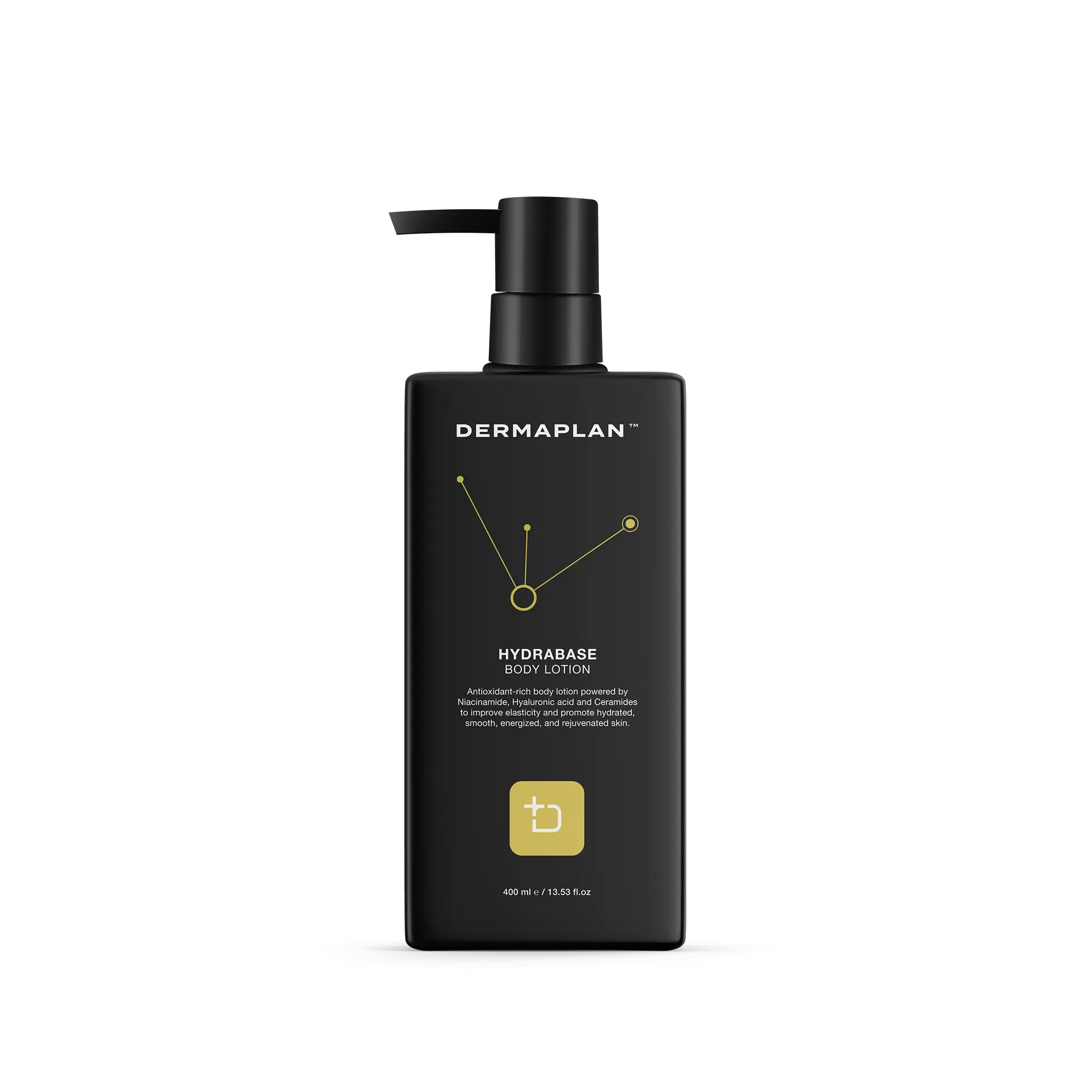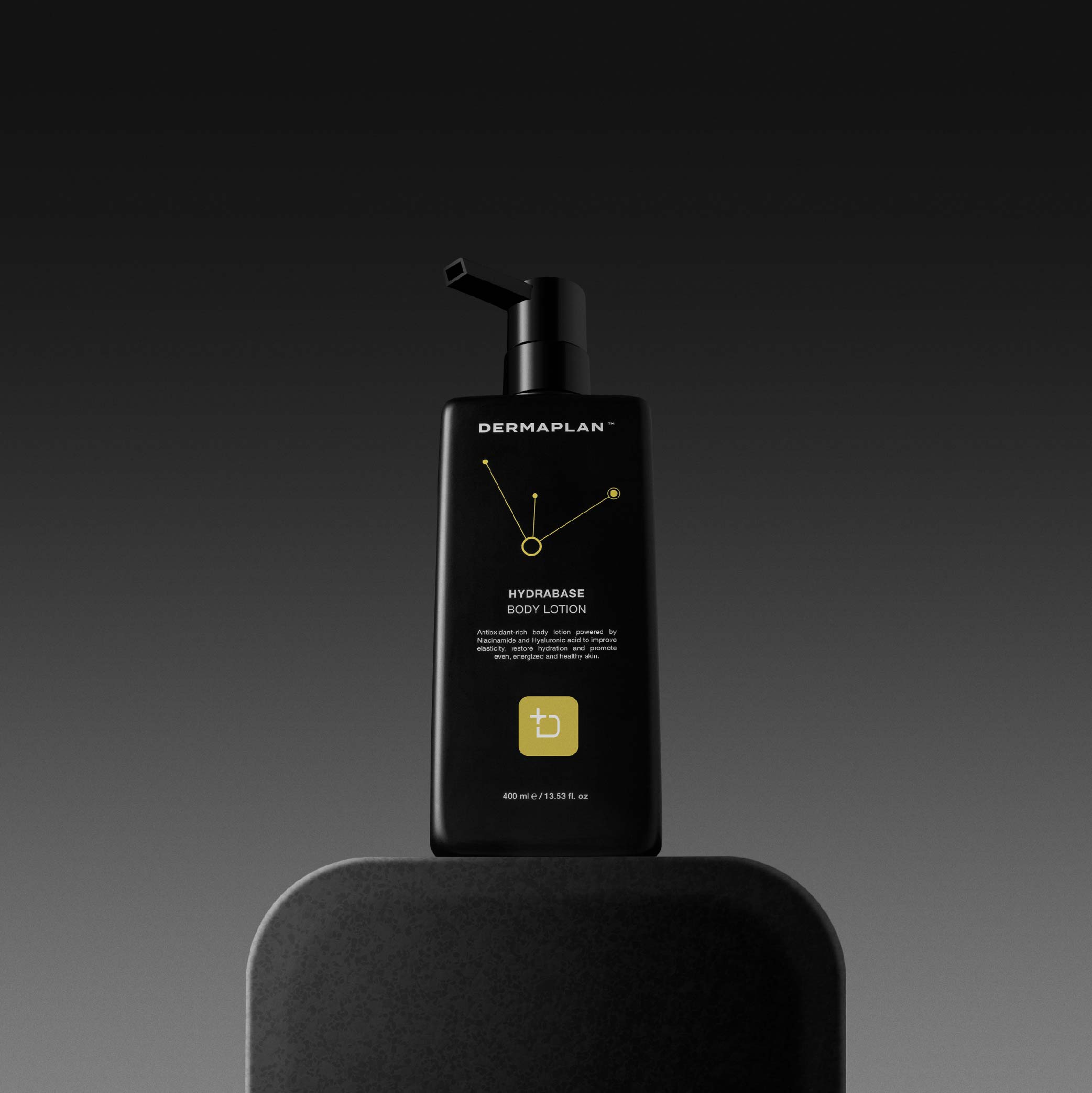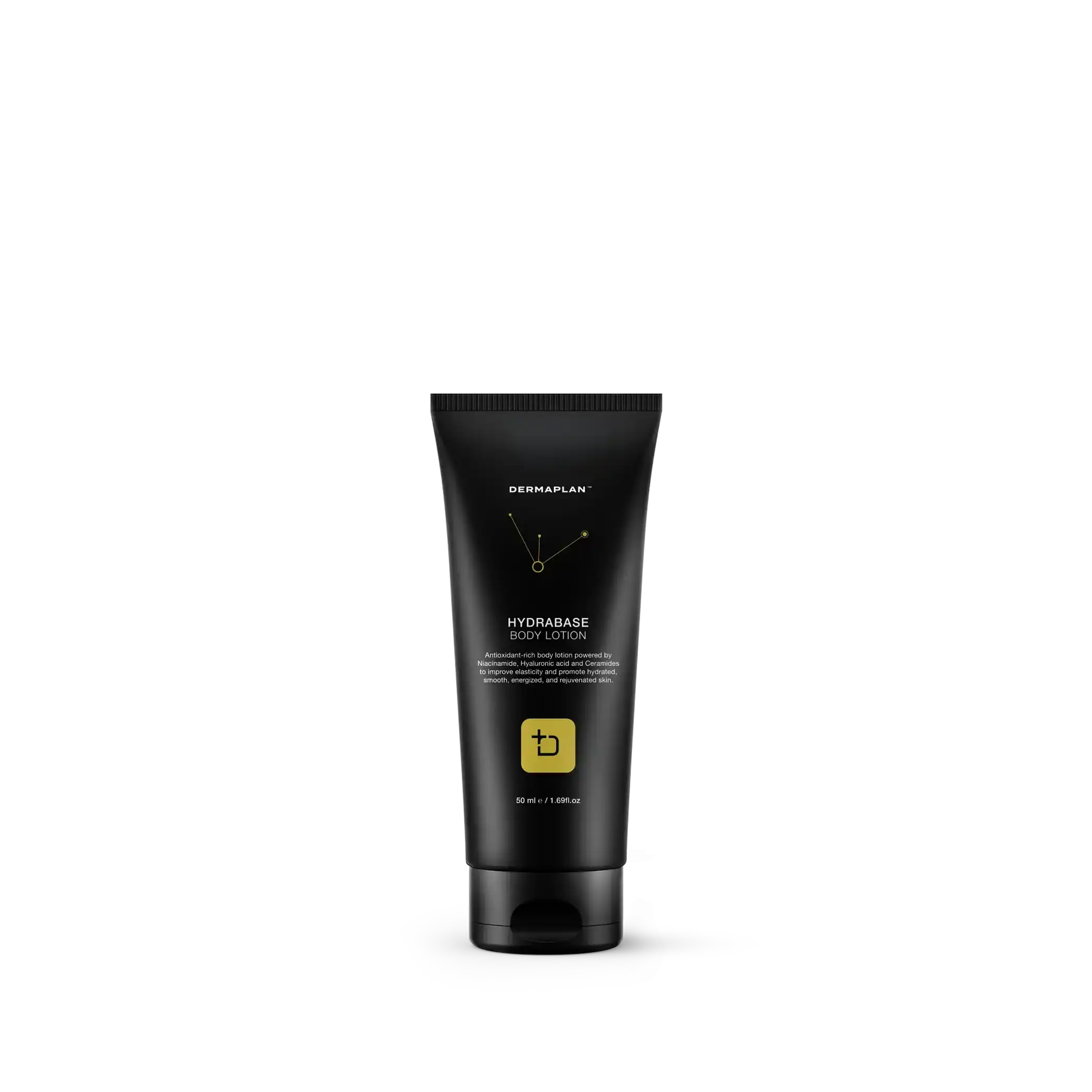






Body Lotion
Please login to view the price
login
Dry skin

aging

pigmentation

Inflammation

Allergies
Antioxidant-rich body lotion powered by Niacinamide and Hyaluronic acid to improve elasticity, restore hydration and promote even, energized and healthy skin.
Hydrabase is an ultra-nourishing body lotion, expertly formulated with optimal concentrations of Niacinamide, pure medical glycerin, d-Panthenol, and Hyaluronic acid. Designed to deliver a burst of replenishing nutrients, Hydrabase effectively revitalizes, soothes, and repairs aging, sun-damaged, and dry skin conditions.
Our advanced formulation is enriched with Ceramides, fatty acids, and Cholesterol, intelligently combining to repair, strengthen, and revive the skin barrier. This powerhouse blend of potent ingredients supports the dermis in retaining moisture, preventing water loss, and restoring the skin structure, resulting in a healthier, more vibrant complexion.
Hydrabase promotes energized, hydrated, and healthy skin, bringing life back to even the most dehydrated complexions.
Experience the transformative power of Hydrabase and give your skin the hydration and care it deserves. Embrace the luxurious feel of supple, rejuvenated skin with this deeply moisturizing body lotion.
Emollients
Emollients are crucial in dermatological care, primarily because they enhance skin hydration and barrier function. Here's a brief overview of their physiological effects and roles in managing various skin conditions.
Physiological Effects
- Hydration of Stratum Corneum: Emollients increase moisture content in the stratum corneum, the outermost layer of the skin, by reducing transepidermal water loss (TEWL). This is achieved through occlusion, which traps water in the skin.
- Restoration of Skin Barrier Function: They aid in replenishing the skin's lipid barrier, which is essential for maintaining skin integrity and protective function.
- Soothing and Smoothing Effects: Emollients smooth, flaky skin cells, making the skin surface appear smoother. They also provide a soothing effect, which can reduce itching and discomfort.
- Anti-inflammatory Properties: Some emollients have ingredients that offer mild anti-inflammatory benefits, helping to reduce redness and irritation.
Managing Dermatological Conditions
- Atopic Dermatitis (Eczema): Emollients are a cornerstone in the management of eczema, helping to maintain skin hydration, reduce flare-ups, and minimize the need for topical corticosteroids.
- Psoriasis: Regular use of emollients can reduce scaling and dryness associated with psoriasis, improving the efficacy of other topical treatments.
- Ichthyosis and Xerosis: These conditions, characterized by dry, scaly skin, benefit significantly from emollients, which help hydrate and soften the skin.
- Aging Skin: Emollients improve the appearance of aging skin by hydrating and reducing the visibility of fine lines and wrinkles.
- Skin Protection: Emollients can protect the skin from irritation and breakdown in individuals with incontinence or those who are bedridden.
References
- Proksch, E., & Lachapelle, J. M. (2005). The Management of Dry Skin with Topical Emollients. American Journal of Clinical Dermatology.
- Lynde, C. W. (2001). Moisturizers: What They Are and a Practical Approach to Product Selection. Skin Therapy Letter.
- Lodén, M. (2003). Role of Topical Emollients and Moisturizers in the Treatment of Dry Skin Barrier Disorders. American Journal of Clinical Dermatology.
Lipid Bilayer Technology
Lipid bilayer technology in dermatology focuses on mimicking and reinforcing the skin's natural lipid barrier, which is vital for maintaining skin health and integrity.
Physiological Effects
- Reinforcement of Skin Barrier: Lipid bilayer technology aims to replicate the skin's natural barrier, particularly beneficial for damaged or compromised skin. This reinforcement helps in reducing transepidermal water loss (TEWL) and enhancing skin hydration.
- Restoration of Lipid Composition: It helps in replenishing the essential lipids that are often deficient in certain skin conditions, thereby restoring the skin's natural protective barrier.
- Improvement in Skin Texture and Hydration: By restoring the lipid bilayer, this technology improves skin texture and overall hydration, leading to healthier, more resilient skin.
- Reduction of Inflammation and Irritation: It can help in reducing inflammation and irritation, particularly in conditions where the skin barrier is compromised.
Managing Dermatological Conditions
- Atopic Dermatitis (Eczema): Lipid bilayer technology is particularly beneficial in managing eczema, as it helps in restoring the deficient skin barrier function, reducing dryness, and controlling flare-ups.
- Psoriasis: In psoriasis, where the skin barrier is also disrupted, this technology aids in hydrating the skin and reducing scaling.
- Aging Skin: The aging skin, which naturally loses lipids over time, benefits from lipid bilayer technology as it helps in maintaining skin hydration and elasticity.
- Dry Skin Conditions (Xerosis, Ichthyosis): Enhancing the skin’s lipid content can significantly improve symptoms of dryness and scaling in these conditions.
- Sensitive Skin: For sensitive skin types, lipid bilayer technology can provide a gentle and effective way to strengthen the skin barrier without causing irritation.
References
- Del Rosso, J. Q., & Levin, J. (2011). The Clinical Relevance of Maintaining the Functional Integrity of the Stratum Corneum in both Healthy and Disease-affected Skin. Journal of Clinical and Aesthetic Dermatology.
- Rawlings, A. V., & Harding, C. R. (2004). Moisturization and Skin Barrier Function. Dermatologic Therapy.
- Man, M. Q., Xin, S. J., Song, S. P., Cho, S. Y., Zhang, X. J., Tu, C. X., ... & Elias, P. M. (2009). Variation of Skin Surface pH, Sebum Content and Stratum Corneum Hydration with Age and Gender in a Large Chinese Population. Skin Pharmacology and Physiology.
Niacinamide
Niacinamide offers several benefits for the skin, primarily due to its anti-inflammatory and antioxidant properties. It reduces the redness and inflammation associated with acne, rosacea, and other inflammatory skin conditions. Additionally, niacinamide's ability to improve the skin's barrier function benefits all skin types, particularly those with eczema or mature skin.
Another significant benefit of niacinamide is its role in reducing hyperpigmentation. Studies have shown that it can decrease the transfer of melanin to the epidermis, helping to fade dark spots and even out skin tone.
Niacinamide also plays a role in reducing the visible signs of aging. It has been found to stimulate collagen production and improve skin elasticity, reducing fine lines and wrinkles. Its antioxidant properties further protect the skin from environmental damage, such as pollution and UV radiation, which contribute to premature aging.
The efficacy of niacinamide and its ability to address multiple skin concerns simultaneously has led to its growing popularity in both over-the-counter and prescription skincare formulations.
Physiological Effects
- Barrier Function Enhancement: Niacinamide helps strengthen the skin’s barrier function by increasing the production of ceramides, lipids that keep the skin hydrated and protect against environmental damage.
- Anti-inflammatory Properties: It has notable anti-inflammatory effects, which are beneficial in reducing redness and inflammation associated with acne, eczema, and other inflammatory skin conditions.
- Sebum Regulation: Niacinamide helps regulate sebum production, which controls excess oiliness and can benefit acne-prone skin.
- Hyperpigmentation Reduction: It reduces hyperpigmentation by inhibiting melanosome transfer from melanocytes to keratinocytes, leading to an even skin tone.
- Anti-aging Effects: Niacinamide helps reduce the appearance of fine lines and wrinkles by boosting collagen production and improving skin elasticity.
- Antioxidant Activity: It has antioxidant properties, protecting the skin from oxidative stress and environmental aggressors like UV radiation and pollution.
Managing Dermatological Conditions
- Acne and Oily Skin: Niacinamide effectively manages acne and oily skin by regulating sebum and reducing inflammation.
- Hyperpigmentation and Melasma: Its ability to reduce melanin transfer benefits it in treating hyperpigmentation and melasma.
- Aging Skin: Niacinamide targets wrinkles and loss of firmness.
- Skin Barrier Disorders: Niacinamide is beneficial in treating skin barrier disorders like atopic dermatitis and eczema by enhancing barrier function and hydration.
- Photodamage and Skin Protection: It helps mitigate the effects of photodamage and provides some degree of protection against environmental damage.
References
- Gehring, W. (2004). Nicotinic acid/niacinamide and the skin. Journal of Cosmetic Dermatology.
- Bissett, D. L., Oblong, J. E., & Berge, C. A. (2005). Niacinamide: A B vitamin that improves aging facial skin appearance. Dermatologic Surgery.
- Snaidr, V. A., Damian, D. L., & Halliday, G. M. (2019). Nicotinamide for photoprotection and skin cancer chemoprevention: A review of efficacy and safety. Experimental Dermatology.
- Navarrete-Solís, J. et al. (2011). A Double-Blind, Randomized Clinical Trial of Niacinamide 4% versus Hydroquinone 4% in the Treatment of Melasma. Dermatology Research and Practice, 2011.
Ceramides
Ceramides, a family of lipid molecules naturally present in the skin, are integral to the structure and function of the skin barrier. They are a type of lipid that, along with cholesterol and fatty acids, forms a critical part of the stratum corneum, the outermost layer of the skin. This layer is essential for maintaining skin hydration and protecting against environmental aggressors.
Ceramides, which make up about 50% of the skin's lipid composition, play a pivotal role in maintaining the skin's barrier integrity and preventing transepidermal water loss (TEWL). By doing so, they help keep the skin hydrated and supple.
The loss or reduction of ceramides in the skin barrier is associated with several dermatological conditions, including eczema and psoriasis, where the skin becomes dry, itchy, and prone to irritation and infection. Studies have shown that the application of ceramide-containing moisturizers can effectively improve skin barrier function and increase skin hydration levels.
Ceramides are particularly beneficial for aging skin, which naturally loses ceramides over time, leading to drier and more fragile skin. By replenishing the skin's ceramide content, these products can help combat the signs of aging, such as fine lines and wrinkles.
Ceramides are integral to maintaining skin health, particularly in conditions where the skin barrier is compromised. Their role in hydrating the skin, reducing sensitivity, and improving barrier function makes them an essential component in the management of various dermatological conditions, especially eczema, psoriasis, and dry or aging skin.
Physiological Effects
- Barrier Function: Ceramides are critical components of the skin's lipid barrier. They help to prevent moisture loss and protect against environmental aggressors like pollutants and irritants.
- Hydration: By maintaining the barrier integrity, ceramides keep the skin hydrated, preventing dryness and keeping the skin supple.
- Reducing Skin Sensitivity: They play a role in reducing skin sensitivity and irritation, helping to calm inflamed and reactive skin.
- Anti-aging Properties: Ceramides can improve skin elasticity and firmness, helping to reduce the appearance of fine lines and wrinkles.
- Wound Healing: There is evidence to suggest that ceramides can aid in the skin's natural wound healing process.
Managing Dermatological Conditions
- Eczema and Atopic Dermatitis: Ceramides are often used in the treatment of eczema and atopic dermatitis, where the skin barrier is compromised, leading to dryness, itching, and inflammation.
- Psoriasis: They can help in managing psoriasis by maintaining skin hydration and barrier function, reducing scaling and dryness.
- Aging Skin: Ceramide-containing products are beneficial in anti-aging regimens due to their ability to improve skin barrier function and elasticity.
- Dry Skin (Xerosis): In the treatment of dry skin, ceramides help in restoring skin hydration and barrier function.
- Sensitive Skin: Products containing ceramides are suitable for sensitive skin as they help to restore the skin's natural barrier and reduce irritation.
References
- Del Rosso, J. Q., & Levin, J. (2011). The clinical relevance of maintaining the functional integrity of the stratum corneum in both healthy and disease-affected skin. Journal of Clinical and Aesthetic Dermatology.
- Farwanah, H., Wohlrab, J., Neubert, R. H. H., & Raith, K. (2005). Ceramides and skin function. American Journal of Clinical Dermatology.
- Di Nardo, A., Wertz, P., Giannetti, A., & Seidenari, S. (1998). Ceramide and cholesterol composition of the skin of patients with atopic dermatitis. Acta Dermato-Venereologica.
Hyaluronic acid
Hyaluronic acid (HA) is a naturally occurring glycosaminoglycan found throughout the body's connective, epithelial, and neural tissues. Most abundantly present in the skin, eyes, and synovial fluid, HA is renowned for its exceptional capacity to retain moisture — a single gram can hold up to six liters of water.
In skincare, the primary appeal of hyaluronic acid lies in its unparalleled hydrating abilities. As a humectant, HA attracts and retains moisture from the environment, providing intense hydration to the skin. This hydrating property contributes significantly to maintaining skin plumpness, suppleness, and elasticity.
Beyond hydration, hyaluronic acid also plays a vital role in skin repair and regeneration. It supports the skin's healing and repair processes, and its anti-inflammatory properties help calm irritated skin. Moreover, HA's ability to promote collagen production, a crucial protein for skin elasticity, further underscores its anti-aging benefits.
The molecular size of hyaluronic acid influences its skin penetration and efficacy. High-molecular-weight HA remains on the skin's surface, providing hydration and forming a barrier against moisture loss. In contrast, low-molecular-weight HA penetrates deeper into the skin's layers, offering more profound hydrating and rejuvenating effects.
Hyaluronic acid's remarkable ability to hydrate, improve skin elasticity, aid in wound healing, and provide antioxidant protection makes it valuable in managing various dermatological conditions, particularly aging, dryness, and sensitive skin.
Physiological Effects
- Hydration: Hyaluronic acid is a powerful humectant that can hold up to 1000 times its weight in water, significantly enhancing skin hydration and leading to plumper, more hydrated skin.
- Skin Elasticity and Wrinkle Reduction: By increasing skin moisture, it improves skin elasticity, reduces the appearance of fine lines and wrinkles, and gives the skin a more youthful appearance.
- Wound Healing: It plays a role in wound healing due to its ability to regulate inflammation levels and signal the body to build more blood vessels in the damaged area.
- Barrier Enhancement: Hyaluronic acid helps reinforce the skin's natural barriers, protecting against environmental factors and retaining moisture.
- Antioxidant Properties: It provides antioxidant defense against free-radical damage from the sun and pollution.
Managing Dermatological Conditions
- Aging Skin: Its ability to reduce wrinkles and improve skin elasticity makes it popular in anti-aging skincare products.
- Dry Skin: Hyaluronic acid is beneficial in treating dry skin conditions by providing intense hydration.
- Wound Care: Its role in wound healing is leveraged in post-procedure care, such as after laser treatments, and in healing minor cuts and abrasions.
- Acne Scars: It can help treat acne scars by promoting skin regeneration and reducing inflammation.
- Sensitive Skin: Hyaluronic acid is suitable for sensitive skin due to its gentle nature. It provides hydration without irritating.
References
- Papakonstantinou, E., Roth, M., & Karakiulakis, G. (2012). Hyaluronic acid: A key molecule in skin aging. Dermato-endocrinology.
- Jegasothy, S. M., Zabolotniaia, V., & Bielfeldt, S. (2014). Efficacy of a new topical nano-hyaluronic acid in humans. The Journal of Clinical and Aesthetic Dermatology.
- Wollina, U., & Abdel-Naser, M. B. (2019). Hyaluronic acid in the treatment and prevention of skin diseases: Molecular biological, pharmaceutical and clinical aspects. Skin Pharmacology and Physiology.




SHIPPING
- Shipping Guarantee: Guiding you to healthy skin isn’t only about our products; it's also about getting them to you as swiftly as the science behind them. That's why Dermal Health offers a shipping guarantee you can rely on.
- Where We Ship From: Orders are dispatched from our facilities in Pretoria.
- Who We Ship With: We trust only well-known, popular, and dependable courier services with your packages.
- When You'll Get It: Expect confident skin soon! Shipping addresses in Pretoria and Johannesburg will enjoy delivery from same-day to 2 business days. Shipping addresses further from Pretoria may expect delivery within 1-4 business days, depending on the service you select during checkout. Your estimated delivery date will reflect during checkout so that you can mark your calendar.
- Tracking Your Order: Eager to start your DermExcel journey? We don't blame you! You'll receive a tracking number after you place your order so that you can follow your package.
For any shipping inquiries, our customer service team is ready to assist.
RETURNS
180-Day Satisfaction Guarantee
Want to log a return? We’ve got you.
You’re welcome to return any product within 180 days of purchase—even if it’s not defective—as long as it’s sealed, unused, in its original packaging, and still within six months of its labeled expiration date (located on the bottom of the product). We get it: sometimes things change.
For non-defective returns, courier costs will be your responsibility.
If you believe a product is defective, please provide a brief explanation so our team can properly assess and process your claim.
Just complete our quick Return Form and we’ll take it from there.
Healthy Skin Isn’t Complicated. Neither Is Our Return Policy.
Visit our Return Policy page or contact our friendly support team if you need assistance.
SECURE PAYMENT
Dermal Health Science 30-Day Confidence Guarantee: We are passionate about guiding you to healthy skin through medical science. We believe in the quality and effectiveness of our products so much that we offer a 30-Day Confidence Guarantee. If you're unsatisfied with your purchase, simply return it within 30 days for a full refund.
Healthy Skin Is Not Complicated and neither is our return policy. Please visit our detailed return policy or contact our friendly customer service team for more information.
Feel as confident in us as we want you to feel in your skin.
- Hydrabase promotes collagen synthesis and improves hydration, helpingAging skin: Revitalize aging skin by improving skin elasticity, reducing the appearance of fine lines and wrinkles, and strengthening the skin barrier.
- Dry Skin (Xerosis): Provides hydration and nourishment, making the skin soft and supple.
- Loss of elasticity: By promoting collagen synthesis and improving hydration, Hydrabase helps enhance the elasticity and firmness of the hands, making it a suitable option for addressing loss of elasticity.
- Ichthyosis: Effective in addressing the scaling, roughness, and excessive dryness associated with ichthyosis, a genetic disorder that impairs the skin's ability to retain moisture.
- Compromised skin barrier: Strengthens and restores the skin barrier, protecting it from environmental stressors and water loss.
- Dull skin: Brighten the complexion and revive dull skin, giving it a healthy and radiant appearance.
- Uneven skin tone: Reduce hyperpigmentation and revitalize the skin.
- Rough or uneven skin texture: Improve skin texture by providing nutrients and hydration.
- Sensitive skin: The gentle formulation is suitable for sensitive skin, providing nourishment without causing irritation.
- Sun-damaged skin: Soothe and repair skin affected by sun damage.
Frequency: Daily
Gently cleanse your skin with a mild, non-irritating body wash or cleanser. We recommend Dermaplan's Cremedify.
Use a clean, soft towel to pat your skin. Leave your skin slightly damp. This will help your skin better absorb the moisturizer and maximize its benefits.
Massage Hydrabase lotion into your skin using circular motions, focusing on areas with dryness, sun damage, or aging concerns.
Apply Hydrabase once or twice daily, or as needed, to maintain skin hydration, improve texture, and soothe irritation.
Active ingredients
- Hydration of Stratum Corneum: Emollients increase moisture content in the stratum corneum, the outermost layer of the skin, by reducing transepidermal water loss (TEWL). This is achieved through occlusion, which traps water in the skin.
- Restoration of Skin Barrier Function: They aid in replenishing the skin's lipid barrier, which is essential for maintaining skin integrity and protective function.
- Soothing and Smoothing Effects: Emollients smooth, flaky skin cells, making the skin surface appear smoother. They also provide a soothing effect, which can reduce itching and discomfort.
- Anti-inflammatory Properties: Some emollients have ingredients that offer mild anti-inflammatory benefits, helping to reduce redness and irritation.
- Atopic Dermatitis (Eczema): Emollients are a cornerstone in the management of eczema, helping to maintain skin hydration, reduce flare-ups, and minimize the need for topical corticosteroids.
- Psoriasis: Regular use of emollients can reduce scaling and dryness associated with psoriasis, improving the efficacy of other topical treatments.
- Ichthyosis and Xerosis: These conditions, characterized by dry, scaly skin, benefit significantly from emollients, which help hydrate and soften the skin.
- Aging Skin: Emollients improve the appearance of aging skin by hydrating and reducing the visibility of fine lines and wrinkles.
- Skin Protection: Emollients can protect the skin from irritation and breakdown in individuals with incontinence or those who are bedridden.
- Proksch, E., & Lachapelle, J. M. (2005). The Management of Dry Skin with Topical Emollients. American Journal of Clinical Dermatology.
- Lynde, C. W. (2001). Moisturizers: What They Are and a Practical Approach to Product Selection. Skin Therapy Letter.
- Lodén, M. (2003). Role of Topical Emollients and Moisturizers in the Treatment of Dry Skin Barrier Disorders. American Journal of Clinical Dermatology.
- Reinforcement of Skin Barrier: Lipid bilayer technology aims to replicate the skin's natural barrier, particularly beneficial for damaged or compromised skin. This reinforcement helps in reducing transepidermal water loss (TEWL) and enhancing skin hydration.
- Restoration of Lipid Composition: It helps in replenishing the essential lipids that are often deficient in certain skin conditions, thereby restoring the skin's natural protective barrier.
- Improvement in Skin Texture and Hydration: By restoring the lipid bilayer, this technology improves skin texture and overall hydration, leading to healthier, more resilient skin.
- Reduction of Inflammation and Irritation: It can help in reducing inflammation and irritation, particularly in conditions where the skin barrier is compromised.
- Atopic Dermatitis (Eczema): Lipid bilayer technology is particularly beneficial in managing eczema, as it helps in restoring the deficient skin barrier function, reducing dryness, and controlling flare-ups.
- Psoriasis: In psoriasis, where the skin barrier is also disrupted, this technology aids in hydrating the skin and reducing scaling.
- Aging Skin: The aging skin, which naturally loses lipids over time, benefits from lipid bilayer technology as it helps in maintaining skin hydration and elasticity.
- Dry Skin Conditions (Xerosis, Ichthyosis): Enhancing the skin’s lipid content can significantly improve symptoms of dryness and scaling in these conditions.
- Sensitive Skin: For sensitive skin types, lipid bilayer technology can provide a gentle and effective way to strengthen the skin barrier without causing irritation.
- Del Rosso, J. Q., & Levin, J. (2011). The Clinical Relevance of Maintaining the Functional Integrity of the Stratum Corneum in both Healthy and Disease-affected Skin. Journal of Clinical and Aesthetic Dermatology.
- Rawlings, A. V., & Harding, C. R. (2004). Moisturization and Skin Barrier Function. Dermatologic Therapy.
- Man, M. Q., Xin, S. J., Song, S. P., Cho, S. Y., Zhang, X. J., Tu, C. X., ... & Elias, P. M. (2009). Variation of Skin Surface pH, Sebum Content and Stratum Corneum Hydration with Age and Gender in a Large Chinese Population. Skin Pharmacology and Physiology.
- Barrier Function Enhancement: Niacinamide helps strengthen the skin’s barrier function by increasing the production of ceramides, lipids that keep the skin hydrated and protect against environmental damage.
- Anti-inflammatory Properties: It has notable anti-inflammatory effects, which are beneficial in reducing redness and inflammation associated with acne, eczema, and other inflammatory skin conditions.
- Sebum Regulation: Niacinamide helps regulate sebum production, which controls excess oiliness and can benefit acne-prone skin.
- Hyperpigmentation Reduction: It reduces hyperpigmentation by inhibiting melanosome transfer from melanocytes to keratinocytes, leading to an even skin tone.
- Anti-aging Effects: Niacinamide helps reduce the appearance of fine lines and wrinkles by boosting collagen production and improving skin elasticity.
- Antioxidant Activity: It has antioxidant properties, protecting the skin from oxidative stress and environmental aggressors like UV radiation and pollution.
- Acne and Oily Skin: Niacinamide effectively manages acne and oily skin by regulating sebum and reducing inflammation.
- Hyperpigmentation and Melasma: Its ability to reduce melanin transfer benefits it in treating hyperpigmentation and melasma.
- Aging Skin: Niacinamide targets wrinkles and loss of firmness.
- Skin Barrier Disorders: Niacinamide is beneficial in treating skin barrier disorders like atopic dermatitis and eczema by enhancing barrier function and hydration.
- Photodamage and Skin Protection: It helps mitigate the effects of photodamage and provides some degree of protection against environmental damage.
- Gehring, W. (2004). Nicotinic acid/niacinamide and the skin. Journal of Cosmetic Dermatology.
- Bissett, D. L., Oblong, J. E., & Berge, C. A. (2005). Niacinamide: A B vitamin that improves aging facial skin appearance. Dermatologic Surgery.
- Snaidr, V. A., Damian, D. L., & Halliday, G. M. (2019). Nicotinamide for photoprotection and skin cancer chemoprevention: A review of efficacy and safety. Experimental Dermatology.
- Navarrete-Solís, J. et al. (2011). A Double-Blind, Randomized Clinical Trial of Niacinamide 4% versus Hydroquinone 4% in the Treatment of Melasma. Dermatology Research and Practice, 2011.
- Barrier Function: Ceramides are critical components of the skin's lipid barrier. They help to prevent moisture loss and protect against environmental aggressors like pollutants and irritants.
- Hydration: By maintaining the barrier integrity, ceramides keep the skin hydrated, preventing dryness and keeping the skin supple.
- Reducing Skin Sensitivity: They play a role in reducing skin sensitivity and irritation, helping to calm inflamed and reactive skin.
- Anti-aging Properties: Ceramides can improve skin elasticity and firmness, helping to reduce the appearance of fine lines and wrinkles.
- Wound Healing: There is evidence to suggest that ceramides can aid in the skin's natural wound healing process.
- Eczema and Atopic Dermatitis: Ceramides are often used in the treatment of eczema and atopic dermatitis, where the skin barrier is compromised, leading to dryness, itching, and inflammation.
- Psoriasis: They can help in managing psoriasis by maintaining skin hydration and barrier function, reducing scaling and dryness.
- Aging Skin: Ceramide-containing products are beneficial in anti-aging regimens due to their ability to improve skin barrier function and elasticity.
- Dry Skin (Xerosis): In the treatment of dry skin, ceramides help in restoring skin hydration and barrier function.
- Sensitive Skin: Products containing ceramides are suitable for sensitive skin as they help to restore the skin's natural barrier and reduce irritation.
- Del Rosso, J. Q., & Levin, J. (2011). The clinical relevance of maintaining the functional integrity of the stratum corneum in both healthy and disease-affected skin. Journal of Clinical and Aesthetic Dermatology.
- Farwanah, H., Wohlrab, J., Neubert, R. H. H., & Raith, K. (2005). Ceramides and skin function. American Journal of Clinical Dermatology.
- Di Nardo, A., Wertz, P., Giannetti, A., & Seidenari, S. (1998). Ceramide and cholesterol composition of the skin of patients with atopic dermatitis. Acta Dermato-Venereologica.
- Hydration: Hyaluronic acid is a powerful humectant that can hold up to 1000 times its weight in water, significantly enhancing skin hydration and leading to plumper, more hydrated skin.
- Skin Elasticity and Wrinkle Reduction: By increasing skin moisture, it improves skin elasticity, reduces the appearance of fine lines and wrinkles, and gives the skin a more youthful appearance.
- Wound Healing: It plays a role in wound healing due to its ability to regulate inflammation levels and signal the body to build more blood vessels in the damaged area.
- Barrier Enhancement: Hyaluronic acid helps reinforce the skin's natural barriers, protecting against environmental factors and retaining moisture.
- Antioxidant Properties: It provides antioxidant defense against free-radical damage from the sun and pollution.
- Aging Skin: Its ability to reduce wrinkles and improve skin elasticity makes it popular in anti-aging skincare products.
- Dry Skin: Hyaluronic acid is beneficial in treating dry skin conditions by providing intense hydration.
- Wound Care: Its role in wound healing is leveraged in post-procedure care, such as after laser treatments, and in healing minor cuts and abrasions.
- Acne Scars: It can help treat acne scars by promoting skin regeneration and reducing inflammation.
- Sensitive Skin: Hyaluronic acid is suitable for sensitive skin due to its gentle nature. It provides hydration without irritating.
- Papakonstantinou, E., Roth, M., & Karakiulakis, G. (2012). Hyaluronic acid: A key molecule in skin aging. Dermato-endocrinology.
- Jegasothy, S. M., Zabolotniaia, V., & Bielfeldt, S. (2014). Efficacy of a new topical nano-hyaluronic acid in humans. The Journal of Clinical and Aesthetic Dermatology.
- Wollina, U., & Abdel-Naser, M. B. (2019). Hyaluronic acid in the treatment and prevention of skin diseases: Molecular biological, pharmaceutical and clinical aspects. Skin Pharmacology and Physiology.
Emollients
Emollients are crucial in dermatological care, primarily because they enhance skin hydration and barrier function. Here's a brief overview of their physiological effects and roles in managing various skin conditions.
Physiological Effects
Managing Dermatological Conditions
References
Lipid Bilayer Technology
Lipid bilayer technology in dermatology focuses on mimicking and reinforcing the skin's natural lipid barrier, which is vital for maintaining skin health and integrity.
Physiological Effects
Managing Dermatological Conditions
References
Niacinamide
Niacinamide offers several benefits for the skin, primarily due to its anti-inflammatory and antioxidant properties. It reduces the redness and inflammation associated with acne, rosacea, and other inflammatory skin conditions. Additionally, niacinamide's ability to improve the skin's barrier function benefits all skin types, particularly those with eczema or mature skin.
Another significant benefit of niacinamide is its role in reducing hyperpigmentation. Studies have shown that it can decrease the transfer of melanin to the epidermis, helping to fade dark spots and even out skin tone.
Niacinamide also plays a role in reducing the visible signs of aging. It has been found to stimulate collagen production and improve skin elasticity, reducing fine lines and wrinkles. Its antioxidant properties further protect the skin from environmental damage, such as pollution and UV radiation, which contribute to premature aging.
The efficacy of niacinamide and its ability to address multiple skin concerns simultaneously has led to its growing popularity in both over-the-counter and prescription skincare formulations.
Physiological Effects
Managing Dermatological Conditions
References
Ceramides
Ceramides, a family of lipid molecules naturally present in the skin, are integral to the structure and function of the skin barrier. They are a type of lipid that, along with cholesterol and fatty acids, forms a critical part of the stratum corneum, the outermost layer of the skin. This layer is essential for maintaining skin hydration and protecting against environmental aggressors.
Ceramides, which make up about 50% of the skin's lipid composition, play a pivotal role in maintaining the skin's barrier integrity and preventing transepidermal water loss (TEWL). By doing so, they help keep the skin hydrated and supple.
The loss or reduction of ceramides in the skin barrier is associated with several dermatological conditions, including eczema and psoriasis, where the skin becomes dry, itchy, and prone to irritation and infection. Studies have shown that the application of ceramide-containing moisturizers can effectively improve skin barrier function and increase skin hydration levels.
Ceramides are particularly beneficial for aging skin, which naturally loses ceramides over time, leading to drier and more fragile skin. By replenishing the skin's ceramide content, these products can help combat the signs of aging, such as fine lines and wrinkles.
Ceramides are integral to maintaining skin health, particularly in conditions where the skin barrier is compromised. Their role in hydrating the skin, reducing sensitivity, and improving barrier function makes them an essential component in the management of various dermatological conditions, especially eczema, psoriasis, and dry or aging skin.
Physiological Effects
Managing Dermatological Conditions
References
Hyaluronic acid
Hyaluronic acid (HA) is a naturally occurring glycosaminoglycan found throughout the body's connective, epithelial, and neural tissues. Most abundantly present in the skin, eyes, and synovial fluid, HA is renowned for its exceptional capacity to retain moisture — a single gram can hold up to six liters of water.
In skincare, the primary appeal of hyaluronic acid lies in its unparalleled hydrating abilities. As a humectant, HA attracts and retains moisture from the environment, providing intense hydration to the skin. This hydrating property contributes significantly to maintaining skin plumpness, suppleness, and elasticity.
Beyond hydration, hyaluronic acid also plays a vital role in skin repair and regeneration. It supports the skin's healing and repair processes, and its anti-inflammatory properties help calm irritated skin. Moreover, HA's ability to promote collagen production, a crucial protein for skin elasticity, further underscores its anti-aging benefits.
The molecular size of hyaluronic acid influences its skin penetration and efficacy. High-molecular-weight HA remains on the skin's surface, providing hydration and forming a barrier against moisture loss. In contrast, low-molecular-weight HA penetrates deeper into the skin's layers, offering more profound hydrating and rejuvenating effects.
Hyaluronic acid's remarkable ability to hydrate, improve skin elasticity, aid in wound healing, and provide antioxidant protection makes it valuable in managing various dermatological conditions, particularly aging, dryness, and sensitive skin.
Physiological Effects
Managing Dermatological Conditions
References
Full Ingredient list
Aqua, white soft paraffin, extra pure lanolin, emulsifying wax, glycerin, stearic acid, paraffinum liquidum, niacinamide, cetyl alcohol, cetomacrogol, isostearyl isostearate, potassium cetyl phosphate, stearic acid, ceramides, cholesterol, ethyl hexyl glycerin and phenoxyethanol, carbomer, d-panthenol, sodium hyaluronate, C12-17 alkane, triethanolamine.
Hydrabase
product benefits

Intensive Moisturization
Intensely moisturize and hydrate the skin with a hypoallergenic formula and advanced biochemical technologies.

Pigmentation and sun-damage treatment
Hydrabase's nourishing ingredients replenish and rejuvenate sun-damaged skin, promoting the skin's natural healing process and reducing the impact of sun damage, including hyperpigmentation.

Anti-Aging
It improves elasticity, skin cell renewal, and collagen synthesis, which helps reduce the visible signs of aging and results in a supple, revitalized, youthful complexion.

Smooth Skin Texture
Improve skin texture and resilience by aiding in skin repair and regeneration, leading to healthier and more resilient skin.
Indications for Hydrabase
Aging Body Skin
Dull & Lifeless Skin
Flaking skin
hydrabase
mode of action
Lipid-Bilayer Technology
DuraQuench IQ SA functions by forming an intelligent lipid bilayer on the skin's surface to regulate water loss and interacting with the lipid bilayers within the stratum corneum to reinforce the skin's natural barrier.
This dual-action mechanism helps retain moisture and enhance the skin's protective barrier, leading to prolonged skin hydration, reduced water loss under varying environmental conditions, and improved skin condition even after wash-off applications.
The intelligent lipid bilayer formed by DuraQuench IQ SA is achieved through a combination of specific ingredients that work synergistically.
- Potassium Cetyl Phosphate: Contributes to the formation of lipid bilayers on the skin's surface.
- Isostearyl Isostearate: Reinforces the skin's natural barrier.
- Stearic Acid and Cetyl Stearate: Replenish long-chain fatty acids and esters typically depleted in dry skin.
- Cetyl Alcohol: Assists in forming liquid crystals, enhancing the moisturizing effect and the stability of the lipid bilayer structure.
Ceramides
Ceramides play a crucial role in maintaining the skin's barrier function and overall health at the physiological level. Their mode of action involves several vital mechanisms:
- Structural Role in Skin Barrier: The skin barrier, primarily located in the stratum corneum (the outermost layer of the skin), consists of corneocytes (dead skin cells) embedded in a lipid matrix. This matrix comprises ceramides, cholesterol, and free fatty acids in a specific ratio. Ceramides are the largest component and are essential for the barrier's structural integrity, functioning like the 'mortar' that holds the 'bricks' (corneocytes) together. By maintaining this structure, ceramides prevent excessive water loss and protect against the entry of harmful substances.
- Hydration and Water Retention: Ceramides help the skin retain moisture by forming a protective layer that limits water evaporation. This is crucial for keeping the skin hydrated, plump, and resilient.
- Regeneration and Repair: Ceramides can support the skin's natural repair processes, particularly after damage caused by environmental factors like UV radiation, pollution, and irritants. They help restore the barrier function, promoting healing and reducing the risk of skin conditions such as dermatitis and eczema.
- Anti-inflammatory Properties: Some studies suggest that ceramides may possess anti-inflammatory properties. These properties help soothe irritated skin and reduce inflammation, beneficial in conditions like psoriasis and eczema.
- Signaling Molecules: Beyond their structural role, ceramides also function as signaling molecules that can influence cell proliferation, differentiation, and apoptosis (programmed cell death). This is significant for skin homeostasis and maintaining a healthy skin barrier.
References:
- Pilgram, G.S.K., Vissers, D.C.J., van der Meulen, H., Pavel, S., Lavrijsen, S.P.M., Bouwstra, J.A., Koerten, H.K. (2001). The effect of 2-hydroxyoctadecanoic acid on human skin and its role in dry skin conditions. Archives of Dermatological Research, 293(4), 191-197.
- Elias, P.M., Wakefield, J.S. (2014). Therapeutic implications of a barrier-based pathogenesis of atopic dermatitis. Clinical Reviews in Allergy & Immunology, 41(3), 282-295.
- Uchida, Y. (2014). Ceramide signaling in mammalian epidermis. Biochimica et Biophysica Acta (BBA) - Molecular and Cell Biology of Lipids, 1841(3), 453-462.
These references highlight the critical role of ceramides in skin physiology, underpinning their use in dermatological products like Curexema for treating and managing dry skin conditions.
Humectants
Humectants has the unique ability to attract and retain moisture from the environment.
Main benefits of Humectants:
- Hydration: Humectants draw water molecules into the skin's outer layer from deeper levels of the skin and, in humid environments, from the air. This hydration helps to improve skin's moisture levels, making it look and feel plump, hydrated, and supple.
- Enhanced Skin Barrier: By promoting hydration, humectants contribute to a healthier skin barrier function. A well-hydrated skin barrier is more effective at protecting against environmental aggressors and less prone to irritation.
- Reduction of Fine Lines and Wrinkles: The hydration provided by humectants can temporarily minimize the appearance of fine lines and wrinkles by plumping up the skin, leading to a smoother, more youthful complexion.
- Improved Skin Texture: Humectants can help to smooth the skin's surface, leading to a softer feel and a more even appearance. This can be particularly beneficial for individuals with dry or flaky skin.
- Promotion of Skin Cell Turnover: By maintaining optimal hydration levels, humectants can support the natural process of skin exfoliation and cell turnover, leading to healthier, more radiant skin.
- Versatility: Humectants are suitable for a wide range of skin types, including oily and acne-prone skin, as they provide moisture without adding oiliness to the skin. This makes them an essential component in various skincare products tailored to different skin needs.
Occlusives
Occlusives form a protective layer on the skin's surface. This layer is a barrier, preventing water loss and shielding the skin from external irritants.
Main benefits of Occlusives
- Prevention of Transepidermal Water Loss (TEWL): Occlusives create a physical barrier on the skin that prevents moisture from evaporating into the air. This is especially beneficial in dry environments where the skin is prone to losing moisture quickly.
- Enhanced Skin Hydration: Occluives help prevent water loss and maintain and enhance the skin's hydration levels. This can lead to improved skin texture, making it feel smoother and softer.
- Protection from Environmental Irritants: The barrier formed by occlusives can protect the skin from various environmental factors, such as wind, cold temperatures, and pollutants, which can strip the skin of its natural oils and lead to dryness and irritation.
- Improved Skin Barrier Function: Regular use of occlusives can help to repair and strengthen the skin's natural barrier function. A healthy skin barrier is crucial for preventing the entry of pathogens and reducing the risk of skin infections and irritations.
- Soothing Dry, Cracked Skin: Occlusives are particularly beneficial for dry, cracked, or chapped skin. They lock in moisture and provide a protective layer to promote healing and reduce discomfort.
- Sealing in Other Moisturizing Ingredients: Occlusives are often used with other moisturizing agents, such as humectants and emollients. By sealing in these ingredients, occlusives enhance their effectiveness, ensuring that the skin remains hydrated for longer periods.
Emmolients
Main Benefits of Emollients
- Hydration: Emollients fill in the gaps between skin cells that are missing moisture, effectively hydrating the skin. Replenishing lost water content helps to maintain the skin's natural moisture balance, making the skin feel softer and smoother.
- Barrier Protection: They form a protective layer over the skin surface, which helps to prevent transepidermal water loss (TEWL), a common issue in dry and eczema-prone skin. This protective layer shields the skin from environmental irritants and allergens, reducing the risk of flare-ups and infections.
- Skin Repair: Emollients help to repair the skin barrier function, which is often compromised in conditions like eczema, psoriasis, and dermatitis. By restoring the integrity of the skin barrier, emollients can improve the skin's resilience against irritants and reduce symptoms of itchiness and inflammation.
- Flexibility and Elasticity: By keeping the skin moist, emollients increase its flexibility and elasticity, which can help to prevent cracks and fissures in dry or thickened skin areas. This is particularly beneficial in preventing the skin from becoming brittle and breaking, especially in areas prone to eczema or psoriasis.
- Soothing Effect: Emollients have a soothing effect on the skin, relieving itching and discomfort associated with dryness and skin conditions. This can help to reduce scratching, which in turn prevents further skin damage and potential infections.
- Enhanced Skin Appearance: Regular use of emollients can improve the appearance of the skin, making it look healthier and more vibrant. They can help to diminish the appearance of dry or flaky skin, providing a smoother and more even skin texture.
Emollients are beneficial for maintaining and restoring skin health, offering hydration, protection, and relief from various skin conditions. Their regular application is key in managing dry skin, enhancing skin barrier function, and improving overall skin appearance and comfort.
Niacinamide
INHIBIT HYPERPIGMENTATION
- Prevents DNA damage through antioxidant activity.
- Prevent melanosome transfer from melanocytes to surrounding skin cells.
______
TREATING ROSACEA, ACNE AND OTHER INFLAMMATORY SKIN CONDITIONS
- Reduce the inflammatory response by inhibiting inflammatory messengers.
- Provides long-lasting protection against bacteria through activation of anti-microbial peptides
- Reduce sebum (oil) production, thus preventing bacterial growth and inflammation.
______
TREATING AND PREVENTING PREMATURE SKIN AGING
- Stimulate collagen synthesis and significantly increase skin elasticity.
- Prevents the breakdown of collagen and elastin through antioxidant and anti-inflammatory activity.
- Prevents DNA damage through antioxidant activity.
- Increases production of ceramides and other stratum corneum lipids to improve skin barrier function.
- Niacinamide boosts cellular energy and may enhance energy-dependent cellular processes such as DNA repair.
lipid bilayer technology
barrier function & repair
Testimonials
It works perfectly on my eczema prone skin on my face!
Absolutely stunning products.
I bought the hydrabase body lotion to use as a moisturiser for my face and I am very happy so far. As a dry skin girly my skin stays moisturised. I also got some free samples which I love.
This is the 4th tub of cream I have tried for my facial ezcema and....holding thumbs ....it IS making a difference. The inflammation has decidedly lessened and the irritation and itchiness is much less.....I really really hope and pray it will last !!!






